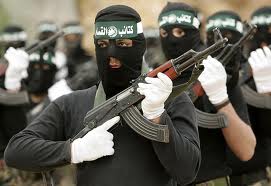Experts often say that one of the biggest obstacles to Israeli-Palestinian peace today is the split between the Palestinians' two major factions: Fatah and Hamas. Fatah cooperates with Israeli security forces and is committed in principle to the two-state solution. Hamas calls for Israel’s destruction and just bombarded southern Israel with rockets.
It's easy to forget, though, that in the 1980s Israel viewed the PLO, led by Fatah, much as it views Hamas now. The goal of the First Lebanon War, in 1982, was to oust the PLO from Beirut and to prevent it from attacking Israel -- while at the same time bolstering a moderate government in Lebanon. At that time, the PLO was committed in word and deed to Israel's destruction.
Eleven years after the Israeli invasion of Beirut, the PLO's Yasser Arafat signed an agreement with Israeli Prime Minister Yitzhak Rabin on the White House lawn. What had changed? The PLO had agreed to recognize the Jewish state, to negotiate with it secretly and to renounce violence.
Is the same process happening now with Hamas? The organization continues to call for Israel's destruction, and rained bombs on it this week. But after winning Palestinian elections in 2006, six years of governing Gaza seem to have led recently to Hamas' pursuing stability. Indirect negotiations between Israel and Hamas, via Egypt, have happened several times. Evidence suggests that most of the bombs launched at Israel before this weekend were the work of more extremist groups such as Islamic Jihad, rather than Hamas. A recent New York Times story reported that Hamas is now "sharing an interest" with Israel in controlling these extremist groups. And an editorial yesterday in Israeli daily Yediot Aharonot said that "Israel has no interest in Hamas being replaced by more extreme elements."
As long as southern Israel remains under attack, though, and Hamas continues to not recognize Israel, Israeli officials will be loath to call the group anything close to “moderate.” Defense Minister Ehud Barak said that "As far as Israel is concerned, Hamas is responsible for the rocket-fire and all other attempts to harm our soldiers and civilians [from Gaza], even when other groups participate. And it is Hamas that will pay the heavy price, a price that will be painful."
Another difference between the PLO's and Hamas' trajectories is that while the PLO was secular, Hamas is an Islamist group with an Islamist government in Gaza. This suggests that it will stay true to its foreign-policy fundamentalism as well. In an interview with the Forward this year, Hamas leader Mousa Abu Marzook said his organization "will not recognize Israel as a state." And the ascendance of Hamas' Egyptian sponsor, the Islamist Muslim Brotherhood, provides a boost to the group's policies.
So while we've been surprised before, an improved status quo with a moderate Hamas seems like a long shot -- at least for now.

No comments:
Post a Comment